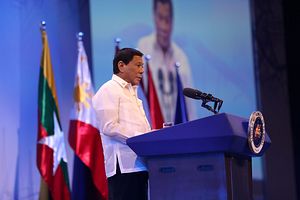Various political analysts and commentators have already shared their views on Rodrigo Duterte’s first year as president of the Philippines. But so far, only a few have said something about Vice President Leni Robredo’s first year in office.
Those unfamiliar with the Philippine political system might ask the relevance of discussing Robredo’s performance as vice president. After all, isn’t she part of Duterte’s administration?
This is precisely the dilemma of the vice president in Philippine politics; in fact, he or she has no specific mandate to perform in the Cabinet or in government other than to attend ceremonial functions.
Currently, the vice president is elected separately from the president. That means that there’s always the chance that the country’s top two leaders will come from different, warring parties. Indeed, Robredo was not Duterte’s running mate in the 2016 election.
Though Robredo may be the second highest official of the land, she holds no position in the Cabinet. She was appointed by Duterte to head the housing agency but she resigned from her post in December 2016 after she was told by Duterte’s cabinet secretary to stop attending meetings in the presidential palace.
Robredo’s situation is not unique. Her predecessors served in the Cabinet because they were appointed by the sitting president. Joseph Estrada was anti-crime czar in 1992, Gloria Macapagal Arroyo was social welfare secretary in 1998, Teofisto Guingona was foreign affairs secretary in 2001, and both Noli de Castro and Jejomar Binay were in charge of the government’s housing program in 2004 and 2010.
As a member of the Cabinet, the vice president is expected to support the president’s agenda. This is easy if both the vice president and the president belong to the same party or electoral coalition, as with the case of Noli de Castro, when he diligently served his role as a supportive member of Arroyo’s Cabinet from 2004 to 2010.
But political tensions will arise if the vice president is suspected of maneuvering to undermine the president or supporting the opposition. It gets even more complicated if the vice president has publicly declared his or her intention to run for president in the next election. His or her every action in the Cabinet will be perceived as partisan and detrimental to the president’s political interest.
On June 30, 2017, Robredo released a report detailing the activities of her office in the past year. The report highlighted her concern to reach those who live in the margins of society. While this is fine advocacy, the vice president’s office can only do so much. It has limited resources and it does not have the institutional capability to direct all local government units and agencies in the national bureaucracy.
It is also a good thing that Robredo, despite having no Cabinet position, has decided to focus on outreach and delivery of social services instead of simply waiting for the unlikely premature termination of Duterte’s term.
But what if the next vice president has no social cause to advance other than to promote his or her presidential ambition? That only further increases the likelihood of an outright clash or prolonged underlying tensions between the vice president and the president.
Perhaps it is time to review the functions of the office of the vice president. That can begin by broadening its mandate, identifying the government body that will be headed by the vice president, and specifying the duties that will be the basis to demand accountability from the country’s second highest official.
If the Duterte government ends up pursuing constitutional reforms, it should include the need to enlarge the powers of the vice president for these reasons. Even if its supporters argue that it is not in its narrow self-interest, it could actually help smooth things for the remainder of Duterte’s term by clarifying the division of labor between the two posts.
In the meantime, Robredo, who currently has no Cabinet duties, has all the time in the world to strengthen her legal defense in the election protest case filed by former Senator Bongbong Marcos.
































